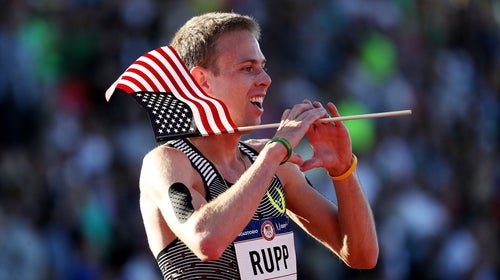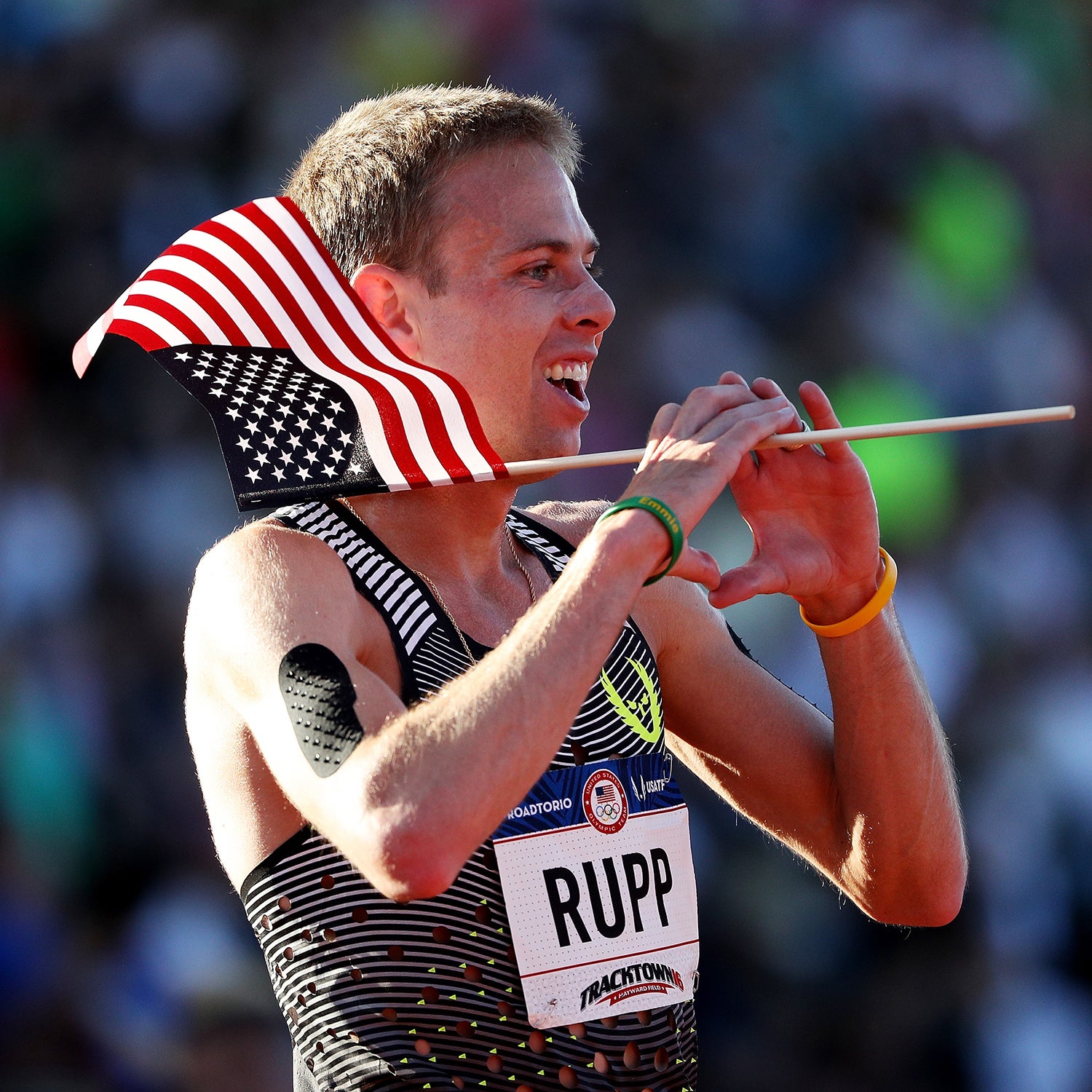When it comes to success in professional sports, the Machiavellian maxim that it’s better to be feared than loved appears to hold true. Many of our best athletes are not loved. Exhibit A would have to be Floyd Mayweather, the planet’s finest (and richest) boxer, whose extracurricular activities include winsome tricks like . Likewise, the perennially successful New England Patriots are only “America’s team” in the sense that they are the team . Much has been said about Michael Jordan. Nobody, to my knowledge, has ever referred to him as “a really nice guy.”
Galen Rupp, on the other hand, seems like a nice guy. As the most accomplished American distance runner of his generation, he would have ample reason to indulge in a little chest-thumping, but that just isn’t who Galen Rupp is.
But who is he? For one thing, he is someone who rarely gives interviews outside of official press conferences. He abstains from social media. On the unusual occasion where Rupp does submit to a casual Q&A, could provide hope for even the most severe case of insomnia. However, what Rupp lacks in public charisma, he more than makes up for in athletic achievement. The results speak for themselves: two Olympic medals (so far), an American record in the 10,000 meters, a Marathon Major victory, a bevy of national titles. Rupp could hang up his shoes today and still have a strong case to be considered the best American runner in history.
So why doesn’t anybody care?
During last fall’s marathon season, the respective responses to Rupp’s victory in the Chicago Marathon and Shalane Flanagan’s triumph in the New York City Marathon couldn’t have been more different. Both races were “historic,” at least in the loose sense that the word is used by contemporary sports media: Rupp was the first American man to win in Chicago in 15 years, and it had been 40 years since an American woman broke the tape in NYC. Flanagan was feted on running Twitter by rivals and fans alike. In an op-ed for the , she was credited for “nurturing and promoting the rising talent around her.” The response to Rupp’s race in Chicago, on the other hand, was noticeably lukewarm—particularly when it came to kudos from fellow professionals. Earlier this month, Rupp won the Prague Marathon in a massive personal best of 2:06:07. It was the fastest marathon by an American on a record-eligible course since 2002 and less than 30 seconds off the national record. The response from the broader U.S. running community was largely: meh.
On the unusual occasion where Rupp does submit to a casual Q&A, the results could provide hope for even the most severe case of insomnia.
This sense of apathy was thrown into sharper relief prior to last month’s Boston Marathon. As part of its prerace media coverage, LetsRun.com hosted a , which included coaches Steve Magness and Danny Mackey, the former Nike runner Kara Goucher, and three elite-athlete coaches who chose to remain anonymous. Of the six experts, only one said they would be rooting for Rupp to win the race. As for the question of whether Rupp was likely to win, one of the anonymous coaches didn’t hold back:
“Honestly, I couldn’t give a shit,” they said. “The approach and all of the nonsense that the Nike Oregon Project has been up to, it just leaves such a bad taste in my mouth that I couldn’t care less.”
The fog of scandal surrounding his longtime training group is ostensibly the reason so many people are reluctant to join the Galen Rupp fan club. At least since the , with its insinuations of illicit testosterone gels, questionable therapeutic use exemptions, and clandestinely packaged pills, the Oregon Project has been viewed with increasing skepticism. In 2017, the New York Times alleging that the training group had administered illegal quantities of the nutritional supplement L-carnitine, which didn’t do much to improve the Oregon Project’s image.
As its lead photo, the Times article features Rupp competing on the track in Eugene while Alberto Salazar, the head coach and mastermind behind the Oregon Project, peers down from above. It’s a remarkably sinister image given the context of the article, in which it is suggested that former Oregon Project runner Dathan Ritzenhein was pressured into taking a high-volume infusion of L-carnitine against his will. There’s a connotation that Salazar is the puppet master who prizes performance above all else, including the well-being of the athletes in his charge. That might sound overly conspiratorial, but former Oregon Project members Goucher and Magness’ testimony for ProPublica portrays Salazar as someone who has a “win at all costs” mentality, as Goucher put it. And the Oregon Project unwittingly perpetuates its villainous reputation. The group’s ominous logo is a winged skull rendered in black and white—a little bit Hermes, a little bit Skeletor.
Salazar has publicly to the ProPublica and Times reports and insisted that he and his athletes “have nothing to hide and are hiding nothing.” For his part, Rupp, who has already been drug-tested five times this year, according to the searchable , has never failed a doping test. Last year, as Erin Strout in Runner’s World, USADA drug-tested Rupp 16 times—the most of any U.S. runner.
Assuming that everything is on the up and up, can the Oregon Project and its number one athlete do more to improve its reputation?
Absolutely. Never mind that Salazar can sometimes . Never mind the Oregon Project’s forbidding coat of arms. Barring the emergence of new shadiness, the most damning thing about the group is its overall aloofness and air of secrecy. No one is expecting that Salazar host a weekly podcast in which he divulges Rupp’s tempo splits or his favorite granola recipe. But if your training group is rumored to be the subject of an ongoing USADA investigation, it seems like more transparency, rather than less, is the way to go. One month before the Rio Olympics, I tried to secure a quick phone interview with Rupp, ostensibly to lob him the softball question of what running “meant to him.” The Nike PR team informed me that, regrettably, Rupp was in pre-Olympic “lockdown,” as though he’d been caught trying to bust out of Salazar’s prison.
One of the joys of writing about distance running is that its heroes are unusually accessible compared to those sports where money and celebrity create an invisible barrier. (It still feels remarkable that I can have the personal number of so many Olympians on my phone; so far I’ve resisted the urge to drunk-dial Meb for training advice, but that day may yet come.) That has never been the case with Rupp.
Not that he’s in any way obligated to speak to the media if he doesn’t wish to. And I certainly can’t blame him for being Instagram-averse. But with Galen Rupp, you always get the feeling that he’s only in it for Galen Rupp. You might say that’s true for every elite athlete, but I would beg to differ. Deena Kastor. Meb Keflezighi. Shalane Flanagan. Des Linden. The other American runners who have won a Marathon Major all managed to exude an —even when they were at the top of their game.
It’s safer to be feared than loved. But the original line includes a caveat: It’s only true when you cannot be both.


